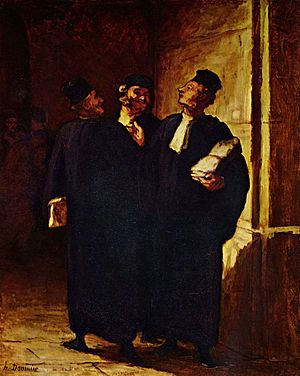Cognitive dissonance facts for kids
In the field of psychology, cognitive dissonance is the mental discomfort (psychological stress) experienced by a person who simultaneously holds two or more contradictory beliefs, ideas, or values. The occurrence of cognitive dissonance is a consequence of a person's performing an action that contradicts personal beliefs, ideals, and values; and also occurs when confronted with new information that contradicts said beliefs, ideals, and values.
Leon Festinger proposed that human beings strive for internal psychological consistency in order to mentally function in the real world. That a person who experiences internal inconsistency tends to become psychologically uncomfortable, and so is motivated to reduce the cognitive dissonance.
The Fox and the Grapes
The fable of "The Fox and the Grapes", by Aesop, is an exemplar of cognitive dissonance by the subversion of rationality. A fox spies high-hanging grapes and wishes to eat them. When unable to reach the grapes, the fox decides the fruit are not worth eating, and justified his decision, claiming to himself, that the grapes likely are sour, for being unripe.
The moral of the fable is that "Any fool can despise what he cannot get"; hence the popular phrase about dismissing a thwarted goal as "unimportant" is mere expression of sour grapes.
The pattern of psychological behavior illustrated in the fable of "The Fox and the Grapes" indicates that: When a person desires something and finds that it is unattainable, he or she diminishes it by criticizing the object of desire as worthless
Images for kids
-
After performing dissonant behavior (lying) a person might find external, consonant elements. Therefore, a snake oil salesman might find a psychological self-justification (great profit) for promoting medical falsehoods, but, otherwise, might need to change his beliefs about the falsehoods.
-
In the fable of “The Fox and the Grapes”, by Aesop, on failing to reach the desired bunch of grapes, the fox then decides he does not truly want the fruit because it is sour. The fox's act of rationalization (justification) reduced his anxiety over the cognitive dissonance from the desire he cannot realise.
See also
 In Spanish: Disonancia cognitiva para niños
In Spanish: Disonancia cognitiva para niños






